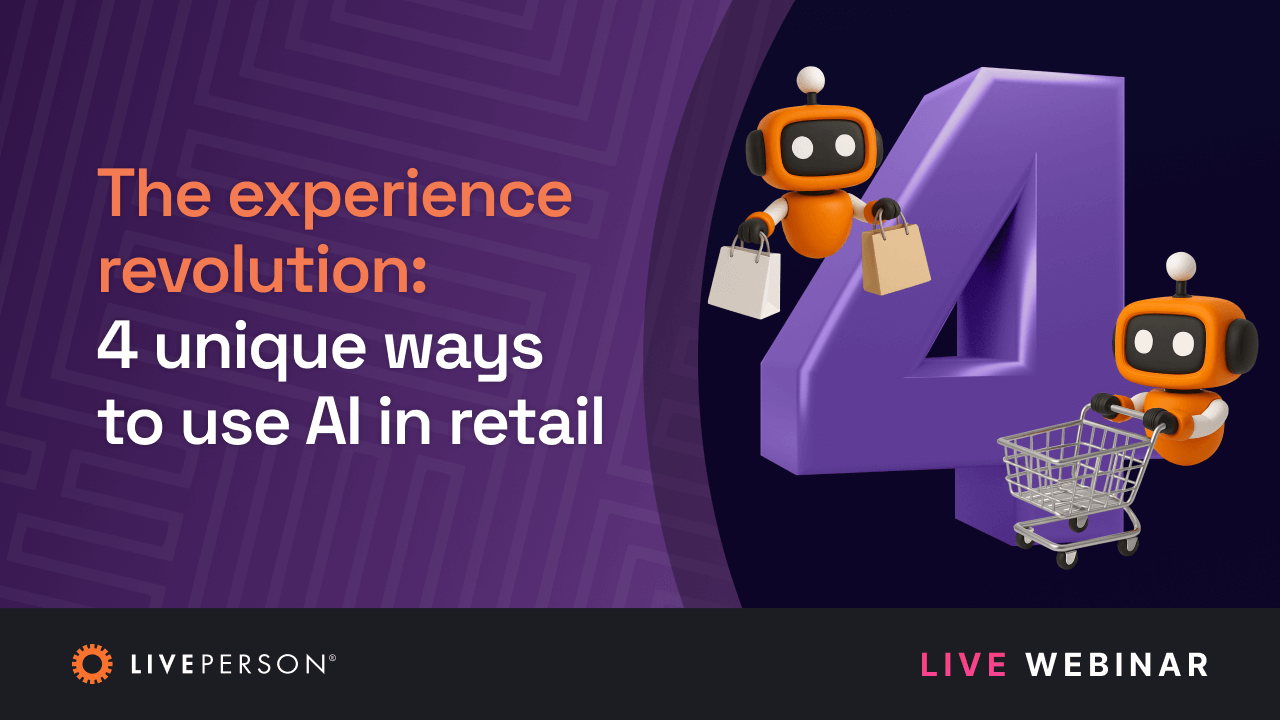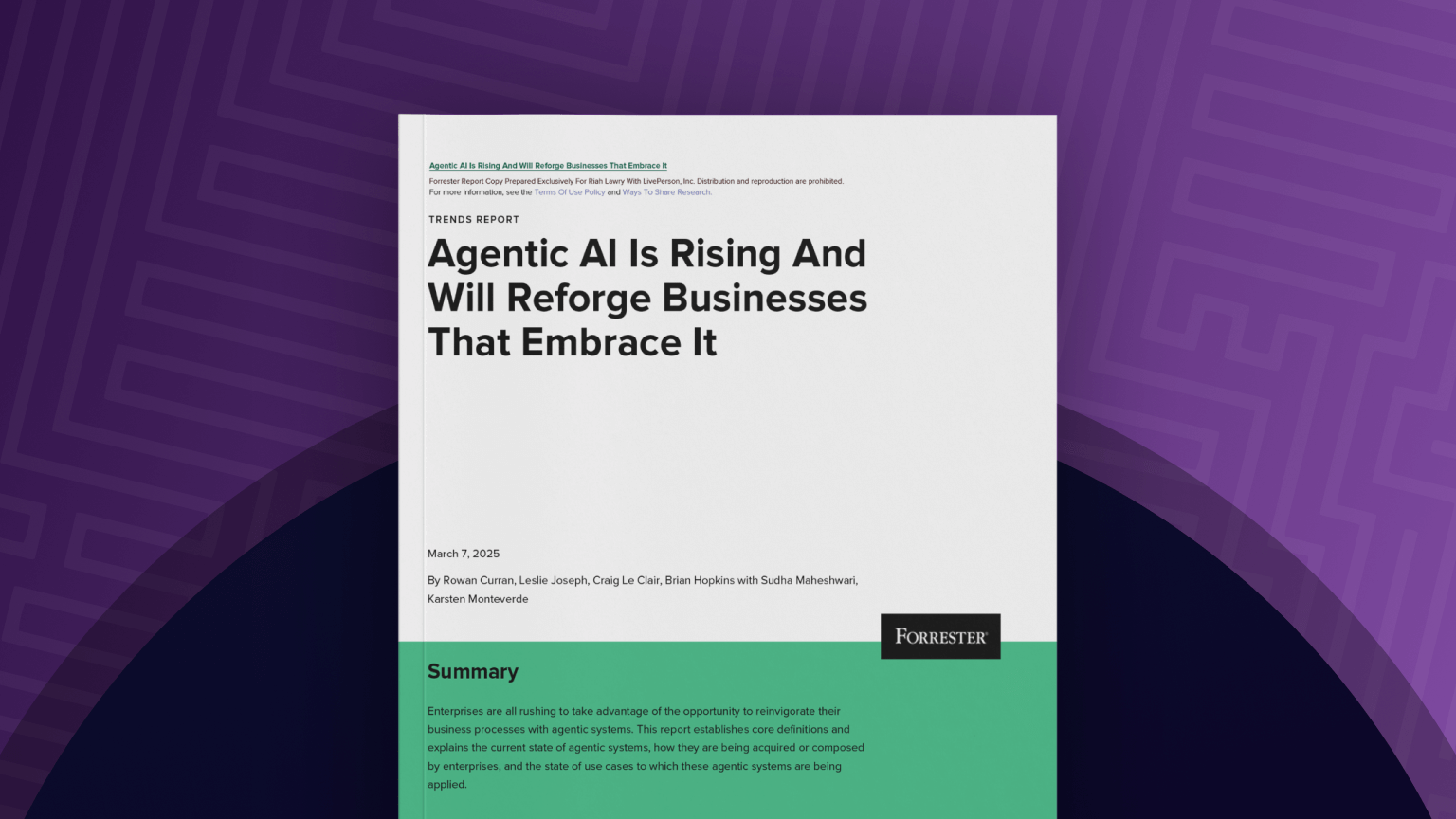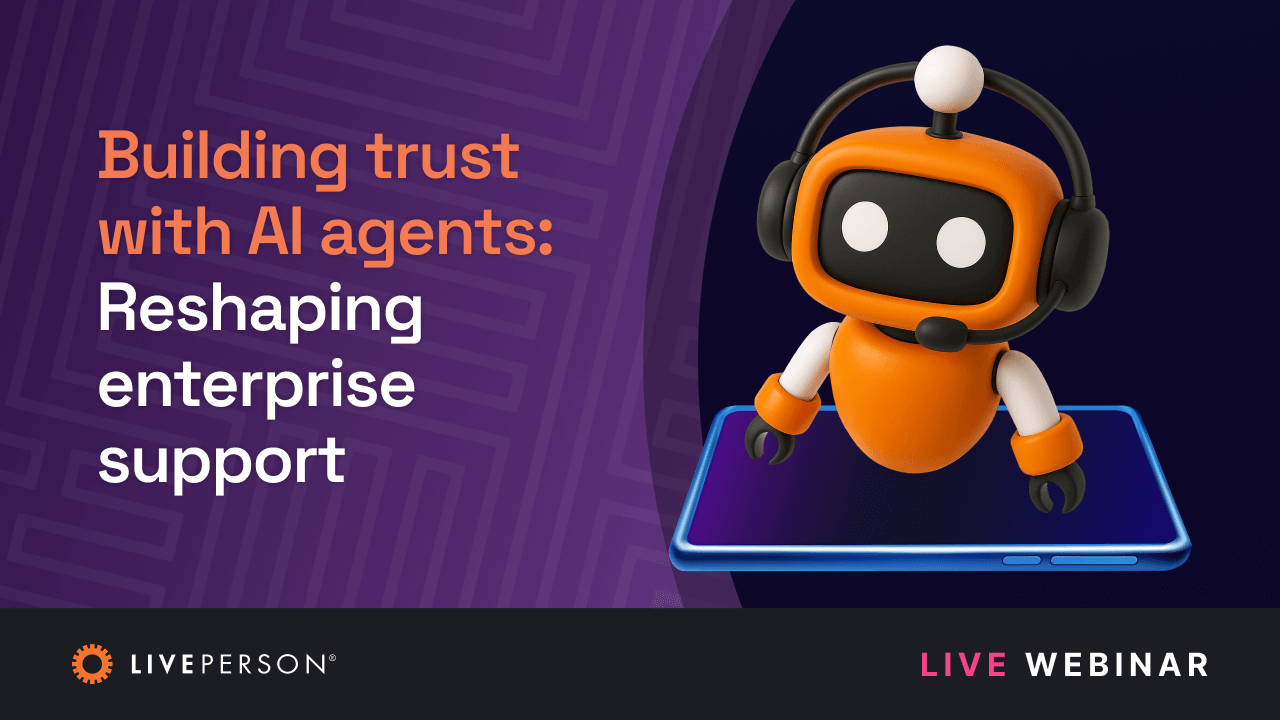article
What is conversational intelligence: How it matters and who benefits
Conversational intelligence is how we make conversing with artificial intelligence as seamless as possible
October 11, 2023 • 5 minutes

[Updated] Originally posted on September 19, 2022
How we define a conversation has changed in the last few decades.
Where or how a conversation takes place is no longer limited to verbal interactions when we have channels like text, email, social media, and more. And who — or what — we have those conversations with are evolving too. Conversational AI tools, such as those powered by LivePerson’s Conversational Cloud®, make customer interaction with artificial intelligence feel as natural as human conversations.
For businesses, the more customer conversations that take place the better, as long as they’re able to analyze and act upon insights from within that conversation data. With more digital data on customer interactions, businesses can improve their operations, sales teams, customer experience, and even the natural language processing technology behind their AI chatbot. Doing so will make it easier for the bot to analyze customer interactions more accurately to determine intent, better identify customer sentiment, and improve the customer experience.
So what is conversational intelligence?
Conversational intelligence is the process of collecting, organizing, and presenting voice and text data from customer conversations using AI. Conversational intelligence can help brands identify patterns and find opportunities to improve the customer experience, brand reputation, and ultimately the bottom line.
One of the biggest benefits of conversational intelligence is that the data can be used to support decision-making around a brand’s Conversational AI strategy. Conversation intelligence solutions help extract real-time insights that can improve the entire conversation journey. Meaningful, actionable insights from conversation data can give a conversational strategist, designer, and analyst a holistic overview of the customer experience so that it can be shaped and improved. From there, they can use that data to improve both human conversations and AI customer interactions.
Why conversational intelligence is important
Conversational or conversation intelligence shapes the strategy and design of a Conversational AI program. Businesses using conversation intelligence software can drive value in the customer journey — financial and user experience — by informing designers in several areas:
- Identifying the highest-impact opportunities for artificial intelligence to automate flows
- Showing customer experience challenges that can be improved via personalization
- Guiding the creation of agent training and tooling
- Understanding what is, and is not, working in machine-learning automation programs
- Benchmarking performance against others in the industry
With this knowledge, brands can:
- Reduce costs through agent efficiency and self-service automation
- Increase sales and revenue by giving customers the right information at the right time in their buying process or renewal journey
- Increase lifetime customer value through personalized experiences that keep them coming back
- Improve customer satisfaction (CSAT) and net promoter scores (NPS) by moving from voice to messaging with automation
Each of these improvements can significantly impact on a brand’s bottom line and customer experience. At LivePerson, we’ve seen several success stories after brands applied conversation intelligence to engage and support customers and agents alike.
That includes raising CSAT 70% with improved efficiency, increasing sales through intent-driven supply chain decisions, and achieving major spikes in sales conversion rates by 42%. All of these gains stem from using conversational analytics tools to gain valuable insights that drive improvement and shape engagement and automation strategies.
The benefits of conversation intelligence
So who has the most to gain from harnessing the power of conversation intelligence? The short answer is simple: any brand.
Conversation data from consumer experiences — voice and digital — can be a goldmine of information used across your entire organization. From the sales team to business leaders, conversation intelligence platforms open up a whole new world of valuable insights. This data translates to better things for your bottom line — more leads for your sales team, an enhanced customer experience, and a deeper understanding of customer behavior.
Opus Research, in their 2021 Conversational Intelligence Intelliview report, emphasizes how conversational intelligence is critical across many parts of an organization.
“CI has taken on first-order importance among Customer Experience, Contact Center, Marketing, Product Management and Digital Transformation professionals, as well as C-Suite execs,” the report states. “Solution providers start with call recordings or chat transcripts, subject them to AI-supported analytics, augment them with related metadata for context, and transform them into the foundation for successful customer experiences and improved employee productivity.”
How teams drive results with conversation intelligence
There are numerous ways conversation intelligence can play a critical role in a company’s success, from making contact centers more efficient to saving money. Using conversational intelligence to analyze conversations, brands can improve product messaging and services by better understanding customer profiles, preferences, common pain points, and more.
- Contact Centers: This data creates better visibility into agent performance, customer questions, and most common customer expectations and needs. Those data-driven insights are used to shape agent training, develop the tools agents use, and create the relevant content provided to them and customers.
- Marketing and sales: Collecting critical insights from customer interactions also helps marketers and sales leaders develop strategies to increase awareness, demand, and retention. With a deeper understanding of what customers want, they can optimize marketing messaging, streamline customer retention campaigns, and drive revenue growth.
- Organizational programming: Conversation intelligence also validates the success of transformation programs and establishes strategic roadmaps for further organizational changes. It has an impact internally — human resources, legal, or IT programs — and externally — customer service, sales conversations, lead generation, and more.
- Design teams: Conversation designers and bot builders can use all the data to better understand the consumer experience, translating into more natural, personal bot dialogue that helps solve consumer problems. Designers can also assess what works (or doesn’t) in their automations — bringing focus to Conversational AI programs — leading to quicker responses to customer issues and happier customers.
- Executives: Successful leaders can use valuable insights from conversation intelligence software to shape corporate strategy while providing direction that supports an optimal customer experience.
From customer conversations to actionable insights
Conversational intelligence is more than a trendy phrase. It’s foundational to a brand’s success.
Customers provide critical contact center data that can be used across an organization to drive significant value. Businesses analyzing customer interactions through conversation intelligence platforms can find valuable, actionable insights. This is a way to collect and act on direct feedback found in customer phone calls, sales conversations, texts, emails, and other conversation channels. LivePerson is focused on providing innovative ways to present conversational intelligence solutions to business leaders, enabling them to make data-driven decisions that have real business impact.




